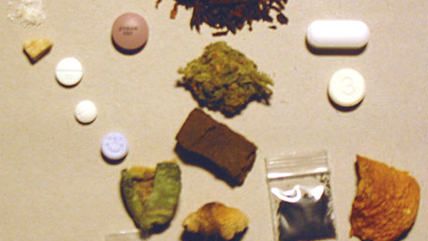The War on Drugs Is Worse Than NSA Spying
We've simply become accustomed to older, more ingrained abuses.

As Americans obsess over NSA spying, abuse by the IRS and other assaults on our freedom, I can't get my mind off the thousand other ways politicians abuse us.
In their arrogance, they assume that only they solve social problems. They will solve them by banning this and that, subsidizing groups they deem worthy and setting up massive bureaucracies with a mandate to cure, treat and rescue wayward souls.
Their programs fail, and so they pass new laws to address the failures. It's one reason that 22 million people now work for government.
Some of the things they do seem like bigger assaults on our freedom than NSA spying, although we've become accustomed to the older abuses.
Take the drug war.
It's true that some Americans destroy their lives and their families' lives by using drugs. Others struggle with addiction. But if illegal drugs are as horrible and addictive as we've been told, how come the government's own statistics say millions try those drugs but only a small percentage continue using?
Ninety-five percent of those who have tried what we think of as "hard drugs" report not using the substances in the past month.
Columbia University psychology professor Dr. Carl Hart, author of "High Price: A Neuroscientist's Journey of Self-Discovery," says "hard" drugs are not as dangerous as the media make them out to be. For 15 years, he's studied the effects of marijuana, methamphetamine, crack cocaine and more on users.
"The data simply shows that the vast majority of people who use these drugs don't go on to become addicted," he said on my show. "In fact, some of these people go on to become president."
He means Presidents Clinton, Bush, and Obama. "All those guys used illegal drugs at some point."
Society has grown more accepting of marijuana, but many people believe crack and meth are far more dangerous and addictive, and that they quickly lead to violent criminal behavior.
"The same thing was said about marijuana in the 1930s," Hart cautions. "People said you use this drug, you go on to commit murder, you go on to use heroin." New drugs always frighten the authorities.
When the panic over meth passes, we may look back on it with amusement, much the way people now look back on the anti-marijuana propaganda film "Reefer Madness."
"That was allowed to happen because few people actually used marijuana," says Hart. The unknown is scarier than the familiar -- like beer.
To learn what drugs really do, Hart advertises for drug users on Craigslist, and then, with government approval, he gives users drugs at his lab at Columbia. He's discovered that drug users' brains react in similar ways to the brains of alcohol consumers.
"The vast majority of people who use drugs like cocaine use it on weekends, monthly or every six months," says Hart. "Most hold jobs. Pay taxes. They do those things, in a similar way that we use drugs like alcohol."
Government's anti-drug crusaders think they protect kids by hyping the threat, but Hart says they actually make it harder for people like him to educate the public about real dangers. After the hype over marijuana, young people no longer trust warnings about other drugs.
Finally, he adds, politicians' futile war kills more people than the forbidden substances themselves.
The gangs of today, like the Crips and the Bloods, are motivated by the absurd profits created when legitimate businesses aren't allowed to sell something -- just as Al Capone's empire and the violence of his turf wars were created by forbidding mainstream businesses to sell alcohol.
In fact, Hart says, the drug war is worse than Prohibition. It costs more, has lasted longer and doesn't just kill people in the U.S.: From Afghanistan to Colombia, American helicopters try to destroy drug crops. Foreigners gain one more reason to hate Yankees.
Arrogant and ignorant politicians do more harm than the social problems themselves.


Show Comments (150)